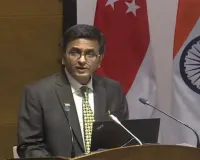
Centre Defends Dropping CJI From EC Selection Panel In SC, Says 'Commission's Independence Doesn't...'
New Delhi: Opposing pleas seeking a stay on the Chief Election Commissioner and other Election Commissioners Act, 2023, the Centre has told the Supreme Court that the independence of the Election Commission, or any other organisation or authority, does not arise from and is not attributable to the presence of a judicial member on the selection committee.
The pleas have argued that the appointment of two new election commissioners should be as per the apex court’s judgement, which mandated the presence of the Chief Justice of India on the selection committee.In a written response, Additional Secretary, Legislative Department, Ministry of Law & Justice, said: “The case of the petitioners is premised on one fundamental fallacy that the independence can only be maintained in any authority when the selection committee is of a particular formulation”."The independence of the Election Commission, or any other organisation or authority, does not arise from and is not attributable to the presence of a judicial member on the selection committee," it added.The government said that it is submitted that equally, the presence of senior government functionaries on the selection committee cannot in and of itself be a ground to automatically assume bias on behalf of the committee.“It is submitted that the high constitutional functionaries ought to be presumed to act fairly and in good faith in the public interest. To indicate, as the petitioners suggest, that a selection committee without judicial members, would invariably be biased is wholly incorrect”, said the written response. The government’s response stressed that such an argument would read an implied limitation into the otherwise plenary power of Article 324 (2), which is impermissible.The government said it should be kept in mind that the Election Commission of India has been able to function neutrally and effectively even during the era of full executive discretion in appointment. It added that as a high constitutional office, the chief election commissioner enjoys protection that is inbuilt into the Constitution and which enables him to act impartially.“It is submitted that the allegations of disingenuous motive and premeditation on the part of the government are wholly without basis. It is well settled that no law duly made by the competent legislature can be challenged on the ground that it was made with an ulterior motive”, said the government’s response.The Centre denied allegations that two election commissioners were hastily appointed last week to pre-empt any orders passed by the court on the next day, when the matter was listed for hearing. “The list of shortlisted persons was made available to the leader of the single largest party in opposition as soon as after the search committee had finalized six names for recommendations to the selection committee”, it added. The government said the credentials of the persons finally appointed to the post of election commissioner have not been called into question, and no objection whatsoever has been raised about the fitness eligibility or competence of any of persons named on the list to serve as election commissioner.“There are no allegations against the election commissioners appointed..... Instead, a political controversy is sought to be created only on the basis of bare, unsupported, and pernicious statements about certain vague and unspecified motives behind the appointment”, said the government.“Where no question has been raised about the qualifications of candidates to hold a constitutional post nor has any material been brought on record to show that the candidates are unfit for office, no prima facie case can be said to have been made out”, said the government, seeking dismissal of pleas seeking stay on the Act.The Centre has argued that the 2023 Act is a significant improvement in the appointment process of election commissioners. It emphasized that the Act provides for a more democratic, collaborative, and inclusive exercise, and it is in alignment with the principles laid down in the Anoop Baranwal case.In December 2023, the Chief Election Commissioner & other Election Commissioners (appointment, conditions of service and terms of office) Act, 2023, was passed by the Parliament and notified. The CEC and EC Act 2023, was brought into effect on January 2, 2024. The affidavit was filed in response to stay applications filed by Congress leader Jaya Thakur and the Association for Democratic Reforms, represented by advocate Prashant Bhushan, in pending legal challenges against the 2023 Act. The pleas have argued that the Act is contrary to the constitution bench judgment in Anoop Baranwal (2023).
About The Author

Related Posts
Post Comment
Latest News
 Uttar Pradesh Fake CBI Officer Comes In Beacon-Fitted Car To Inspect Polling Station In Hapur, Held
Uttar Pradesh Fake CBI Officer Comes In Beacon-Fitted Car To Inspect Polling Station In Hapur, Held











Comment List